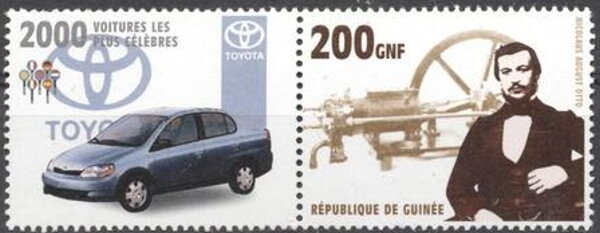Stamp with Attached Label: Cars - Nicolaus August Otto and 2000 Toyota (Guinea 2002)
Cars - Nicolaus August Otto and 2000 Toyota (Guinea 2002)
01 January (Guinea ) within release Cars (2002) goes into circulation Stamp with Attached Label Cars - Nicolaus August Otto and 2000 Toyota face value 200 Guinean franc
| Stamp with Attached Label Cars - Nicolaus August Otto and 2000 Toyota in catalogues | |
|---|---|
| Colnect codes: | Col: GN 2002-39 |
Stamp with Attached Label is square format.
No year date inscribed. Produced by the Eastern European counterfeit producer and distributed by associated counterfeit stamp dealers. They seem to have been exclusive to one Eastern European illegal stamp peddler with the user name Collect4all who claimed these to be 2002 issues from Guinea. Due to no year date inscribed criminal stamp sellers can claim any year. Several years of the cars seem to be missing, so more than what are shown here on Colnect may exist. See the 2001 illegal stamp category for Guinea to see similar designs produced by this same criminal producer. Avoid sellers of these!Also in the issue Cars (2002):
- Stamp with Attached Label - Cars - Nicolaus August Otto and 1963 Rover face value 200;
- Stamp with Attached Label - Cars - Nicolaus August Otto and 1964 Austin face value 200;
- Stamp with Attached Label - Cars - Nicolaus August Otto and 1965 Renault face value 200;
- Stamp with Attached Label - Cars - Nicolaus August Otto and 1966 Fiat face value 200;
- Stamp with Attached Label - Cars - Nicolaus August Otto and 1967 Fiat face value 200;
- Stamp with Attached Label - Cars - Nicolaus August Otto and 1968 Peugeot face value 200;
- Stamp with Attached Label - Cars - Nicolaus August Otto and 1969 Fiat face value 200;
- Stamp with Attached Label - Cars - Nicolaus August Otto and 1970 Citroen face value 200;
- Stamp with Attached Label - Cars - Nicolaus August Otto and 1971 Fiat face value 200;
- Stamp with Attached Label - Cars - Nicolaus August Otto and 1973 Mercedes Benz face value 200;
- Stamp with Attached Label - Cars - Nicolaus August Otto and 1974 Citroen face value 200;
- Stamp with Attached Label - Cars - Nicolaus August Otto and 1976 Chrysler face value 200;
- Stamp with Attached Label - Cars - Nicolaus August Otto and 1978 Ferarri face value 200;
- Stamp with Attached Label - Cars - Nicolaus August Otto and 1979 Chrysler face value 200;
- Stamp with Attached Label - Cars - Nicolaus August Otto and 1980 Lancia face value 200;
- Stamp with Attached Label - Cars - Nicolaus August Otto and 1981 Ford face value 200;
- Stamp with Attached Label - Cars - Nicolaus August Otto and 1982 Renault face value 200;
- Stamp with Attached Label - Cars - Nicolaus August Otto and 1983 Audi face value 200;
- Stamp with Attached Label - Cars - Nicolaus August Otto and 1984 Fiat face value 200;
- Stamp with Attached Label - Cars - Nicolaus August Otto and 1985 Opel face value 200;
- Stamp with Attached Label - Cars - Nicolaus August Otto and 1986 Ford face value 200;
- Stamp with Attached Label - Cars - Nicolaus August Otto and 1987 Opel face value 200;
- Stamp with Attached Label - Cars - Nicolaus August Otto and 1988 Peugeot face value 200;
- Stamp with Attached Label - Cars - Nicolaus August Otto and 1989 Fiat face value 200;
- Stamp with Attached Label - Cars - Nicolaus August Otto and 1990 Citroen face value 200;
- Stamp with Attached Label - Cars - Nicolaus August Otto and 1991 Renault face value 200;
- Stamp with Attached Label - Cars - Nicolaus August Otto and 1992 Volkswagen face value 200;
- Stamp with Attached Label - Cars - Nicolaus August Otto and 1993 Nissan face value 200;
- Stamp with Attached Label - Cars - Nicolaus August Otto and 1994 Ford face value 200;
- Stamp with Attached Label - Cars - Nicolaus August Otto and 1995 Fiat face value 200;
- Stamp with Attached Label - Cars - Nicolaus August Otto and 1996 Fiat face value 200;
- Stamp with Attached Label - Cars - Nicolaus August Otto and 1997 Renault face value 200;
- Stamp with Attached Label - Cars - Nicolaus August Otto and 1998 Alfa Romeo face value 200;
- Stamp with Attached Label - Cars - Nicolaus August Otto and 1999 Ford face value 200;
- Stamp with Attached Label - Cars - Nicolaus August Otto and 2000 Toyota face value 200;
Stamp with Attached Label Cars - Nicolaus August Otto and 2000 Toyota it reflects the thematic directions:
The automotive industry comprises a wide range of companies and organizations involved in the design, development, manufacturing, marketing, selling, repairing, and modification of motor vehicles. It is one of the world's largest industries by revenue (from 16% such as in France up to 40% in countries such as Slovakia).
A car is a wheeled, self-powered motor vehicle used for transportation and a product of the automotive industry. Most definitions of the term specify that cars are designed to run primarily on roads, to have seating for one to eight people, to typically have four wheels with tyres, and to be constructed principally for the transport of people rather than goods. The year 1886 is regarded as the birth year of the modern car. In that year, German inventor Karl Benz built the Benz Patent-Motorwagen. Cars did not become widely available until the early 20th century. One of the first cars that was accessible to the masses was the 1908 Model T, an American car manufactured by the Ford Motor Company. Cars were rapidly adopted in the United States of America, where they replaced animal-drawn carriages and carts, but took much longer to be accepted in Western Europe and other parts of the world.
Engineers, as practitioners of engineering, are professionals who invent, design, analyze, build and test machines, complex systems, structures, gadgets and materials to fulfill functional objectives and requirements while considering the limitations imposed by practicality, regulation, safety and cost.The word engineer (Latin ingeniator, the origin of the Ir. in the title of engineer in countries like Belgium and The Netherlands) is derived from the Latin words ingeniare ("to contrive, devise") and ingenium ("cleverness"). The foundational qualifications of a licensed professional engineer typically include a four-year bachelor's degree in an engineering discipline, or in some jurisdictions, a master's degree in an engineering discipline plus four to six years of peer-reviewed professional practice (culminating in a project report or thesis) and passage of engineering board examinations.
Famous People refers to the fame and public attention accorded by the mass media to individuals or groups or, occasionally, animals, but is usually applied to the persons or groups of people (celebrity couples, families, etc.) themselves who receive such a status of fame and attention. Celebrity status is often associated with wealth (commonly referred to as fame and fortune), while fame often provides opportunities to make money.
An invention is a unique or novel device, method, composition, idea, or process. An invention may be an improvement upon a machine, product, or process for increasing efficiency or lowering cost. It may also be an entirely new concept. If an idea is unique enough either as a stand-alone invention or as a significant improvement over the work of others, it can be patented. A patent, if granted, gives the inventor a proprietary interest in the patent over a specific period of time, which can be licensed for financial gain.




